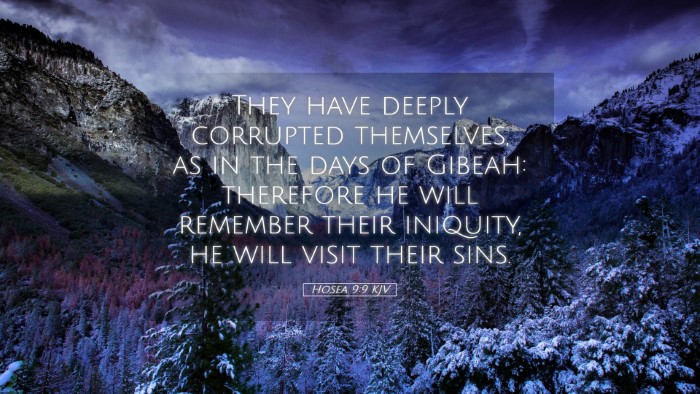Old Testament
Genesis Exodus Leviticus Numbers Deuteronomy Joshua Judges Ruth 1 Samuel 2 Samuel 1 Kings 2 Kings 1 Chronicles 2 Chronicles Ezra Nehemiah Esther Job Psalms Proverbs Ecclesiastes Song of Solomon Isaiah Jeremiah Lamentations Ezekiel Daniel Hosea Joel Amos Obadiah Jonah Micah Nahum Habakkuk Zephaniah Haggai Zechariah MalachiHosea 9:9
Hosea 9:9 KJV
They have deeply corrupted themselves, as in the days of Gibeah: therefore he will remember their iniquity, he will visit their sins.
Hosea 9:9 Bible Commentary
Commentary on Hosea 9:9
Bible Verse: Hosea 9:9 - "They have deeply corrupted themselves, as in the days of Gibeah: therefore he will remember their iniquity, he will visit their sins."
Contextual Analysis
This verse is set within a prophetic context where the prophet Hosea addresses the people of Israel, reflecting on their persistent sin and rebellion against God. The reference to "the days of Gibeah" evokes a notorious period in Israel's history characterized by grave moral decay and violence, specifically the account of the Levite and his concubine found in Judges 19-20, where such wickedness led to national calamity.
Commentary Insights
Matthew Henry's Commentary
Matthew Henry notes that the phrase "deeply corrupted themselves" indicates a profound and deliberate rebellion against God's commandments. He reflects on how Israel, in their idolatry and immoral behaviors, mirrors the sins of Gibeah. Henry emphasizes that God does not overlook such transgressions but remembers iniquities and is just in visiting judgment upon the nation. This is a warning to the contemporary church about the consequences of moral decay.
Albert Barnes' Notes
Albert Barnes elaborates on the historical reference to Gibeah, suggesting that it serves as a stark reminder of what happens when a society turns away from divine law. He interprets "therefore he will remember their iniquity" as an assurance of God’s justice. Barnes asserts that the Lord's remembrance of sin is not passive; it leads to action—divine visitation as a response to corporate sin. This reinforces the theme of accountability and underscores the seriousness of the covenant relationship between God and His people.
Adam Clarke's Commentary
Adam Clarke highlights the cultural and spiritual implications of the Gibeah reference, indicating that the Israelites had not only repeated past sins but had compounded them through their idolatrous practices. Clarke provides a theological perspective that God's remembrance of iniquity is applicable both to the individual and corporate entities. He mentions that such remembrance is not arbitrary; it is part of God’s character to uphold justice, thereby serving as a solemn testament to the enduring consequences of turning away from Him.
Theological Implications
1. The Seriousness of Sin: The comparison to Gibeah reminds readers of the severe consequences of sin. Ancient Israel's decline serves as a warning for current generations. The relentless pattern of sin leads to decay and destruction.
2. Divine Justice: The verse encapsulates two critical components of God's nature: His love and His justice. While God desires reconciliation, He cannot ignore sin, leading to inevitable judgment—demonstrating that divine justice is concerned with righteousness.
3. Collective Responsibility: The visit of judgment indicates that sin is not merely an individual affair; instead, it has corporate implications. The church and communities must collectively strive for holiness to prevent divine judgment.
Application for Today
Pastors, theologians, and students can draw profound applications from this verse. The echo of Gibeah-like behaviors in contemporary society prompts a call for repentance and renewal. Leaders must guide their congregations towards introspection regarding the moral state of their communities. Furthermore, the reminder of God's unwavering justice encourages believers to engage in proactive measures against sin and promote righteousness.
- Call for Repentance: Recognize and turn away from behaviors that lead to spiritual and moral decay.
- Preach Accountability: Encourage congregations to take their spiritual health seriously, recognizing the implications of sin.
- Promote Holiness: Engage actively in teaching and activities that uplift righteousness and reflect God's glory in all aspects of life.
Conclusion
The message of Hosea 9:9 serves a dual purpose: it is a stark reminder of the dire consequences of sin while providing hope for restoration through repentance. By deeply considering the wisdom embedded within this text, scholars and leaders can effectively challenge and encourage their communities to seek God earnestly, fostering an environment of holiness and reverential fear of the Lord.


